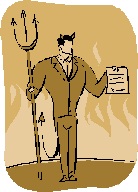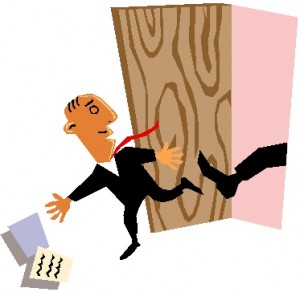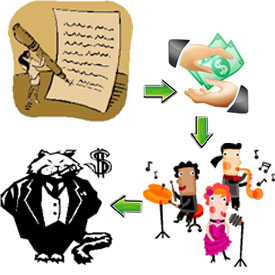For the last few weeks I’ve been writing about indigenous jazz musicians in China–material drawn from my forthcoming book Jazz in the Land of the Dragon.
This week I interrupt this content flow to relate an experience I recently had with a New York City club manager. The club in question specializes in cabaret singers. I went there a few months ago to listen a colleague perform. I was impressed with the décor and the overall ambience. I thought this would be a terrific venue for my jazz quintet, The Heritage Ensemble.
The Offer
Several snail-mail and email correspondences later I finally received an email from the managing director/booking manager to pick a date to perform. He sent me a list of availabilities. I chose an October date. The email also asked, among seven questions “How long have you been in the music business?” and “Do you self-promote or do you use an agent?” I answered the various questions, but their very nature and number gave me pause.
My instinct was correct. A couple of days later I received a contract offer via email. It consisted of several pages and it didn’t take me long to realize that this was the most one-sided contract I had ever read.
To begin with, the club required that as a performer I guarantee 30-50 paying customers at $20-$25 cover charge before the club’s drink/food minimum is applied. Mind you, this is a beautiful looking club, with a proper stage, a baby grand piano, and lighting. But to demand a guarantee seemed out of the ordinary.
 It gets worse. The manager offered 80% of the door if the performer brought in 100+ paying customers. The room holds 120 people. The scale went down from there.
It gets worse. The manager offered 80% of the door if the performer brought in 100+ paying customers. The room holds 120 people. The scale went down from there.
The club also required that the performer pay $100 to the lighting/sound technician, and if the performance went longer than 60 minutes, the technician would get more.
There was also a penalty clause: If the performer cancels the performance 45 days before the agreed upon date, the performer is required to pay the club $250.
Last, the contract called for payment within 60 days (yes, 60 days) to the performer following the performance. The industry norm for gigs of this nature is pay at the end of the performance or at least within a few days.
I said:
 Following was my reply to the managing director/booking manager:
Following was my reply to the managing director/booking manager:
1. Payment: Our usual performance fee agreement is payment immediately following the performance. We cannot agree to payment made by check within 60 days after the performance.
2. Minimum Policy: Our audience typically does not make reservations seven days before a performance. Most of the time it’s a couple of days before the performance, or they just show up. This is not a Broadway show or reservations for a cruise. We cannot agree to this clause.
3. Tech & Videography Fees: The lighting is part of the facility, just like the piano and drum kit. It’s the club’s responsibility to make sure it’s maintained and working. At minimum you will receive 20% of the door. Use these monies to pay for the tech.
4. Cancellation Fee: This clause does not take into consideration “acts of God,” such as, I get hit by a truck, or there’s a hurricane or major snowstorm that shuts down the city. And what if you have a power outage for some reason? This is a professional ensemble with award-winning, Grammy-nominated, mature players, not a fly-by-night, wet behind the ears, twenty-something quintet that needs to be “threatened” with a $250 cancellation fee. We have “never” canceled a performance. We cannot agree to this clause.
He said:
 The managing director/booking manager replied:
The managing director/booking manager replied:
The business model was set up years ago before I took over the business. It seems to work and apparently when the business model changed years back to do exactly what you’re looking for, performers didn’t put any effort into promoting their own show and the club was driven into the ground. We are not a supper club. We are not a promoter. We are not managers or agents. We are just a venue that people want to use to perform to our audience and they are savvy at promoting themselves. This is the way we do things and we have a right to run our business the way we see fit to benefit the performer and to make sure we survive. It’s not easy surviving in this climate and in NYC.
The End Result
Needless to say, I withdrew the offer to perform at this venue and so informed the members of my ensemble. One musician had this to say about this particular club:
They are the epitome of pay-to-play venues. And they have a bad attitude. I’ve mostly
played in there with well-to-do amateurs who coughed up the scratch and had a party.
One of the singers who has performed there had this to say:
From the standpoint of both the player and the audience, it’s not a good club at all. Musicians have to deal with the impossible draw requirements. Audience members have to pay a premium to sit in a booth, even if no one else sits there. The wait staff is rather pushy. . .I won’t ever play there again.
The managing director is entitled to say “we have a right to run our business the way we see fit” and “It’s not easy surviving in this climate and in NYC.” With this attitude it is very clear this club will experience one of two outcomes:
1. It will continue to operate with its current business model because there are too many performers, i.e., mostly female singers, willing to pay the price to play in a venue that has the appearance of a good reputation (which it does not; it’s also in a poor foot-traffic location), or
2. It will fail because performers will begin to realize that the only one getting anything out of the performance is the club.
The pay-to-play model is completely detrimental to a performer’s value. It puts the onus of “audience draw” totally on the performer, while the club reaps all the benefits. If this model is to remain, then the performer should get 100% of the door, while the club gets 100% of the drinks and food.
This model is a form of slavery and unfortunately there are enough performers willing to pay the price just to have the opportunity to get on the stage at a venue that is portrayed as having prestige. It’s laughable. The club manager likens his venue to Feinstein’s uptown on Park Avenue. I’ve reviewed performances at Feinstein’s. There is no comparison.
Every well-established jazz venue I have either performed in or attended as an audience member or reviewer works hand-in-hand on some level with performers to bring in an audience. It’s a matter of collaboration to some degree, not servitude.
When performers realize they are being taken advantage of, and when they accept the reality that paying for a performance opportunity is no way to run their business affairs or to get ahead, pay-to-play joints like the one described above will begin to change their business model or go out of business. It’s too bad that there’s too much supply of stars-in-their-eyes performers and demanding club owners just waiting to fleece them.
Please write to me at meiienterprises@aol.com if you have any comments on this or any other of my blogs.
Eugene Marlow, Ph.D.
September 10, 2012
© Eugene Marlow 2012



